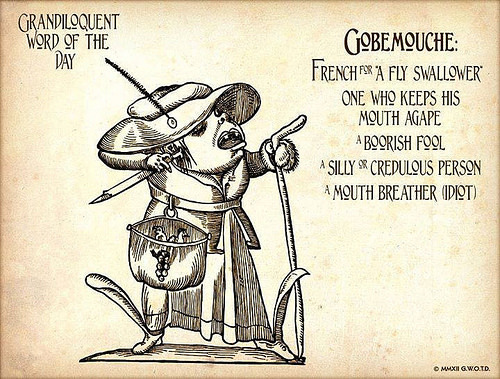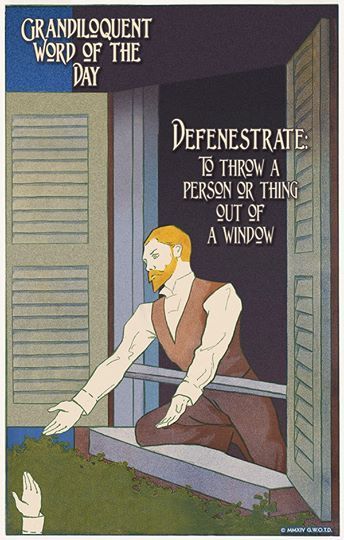Short & Sweet Treats discussion
Take a Coffee Break...
>
Word of the Day
message 301:
by
Ƹ̴Ӂ̴Ʒ Jenn Ƹ̴Ӂ̴Ʒ
(new)
Jan 18, 2014 08:12PM
 I have no idea what a dangling participle is, and I'll never remember. Does not store in my memory.
I have no idea what a dangling participle is, and I'll never remember. Does not store in my memory.
reply
|
flag
 ACERBIC
ACERBICexpressing harsh or sharp criticism in a clever way
ORIGIN: "sour, harsh, severe" (of speech, manners, etc.), from L. acerbus "harsh to the taste, sharp, bitter, sour"
Examples:
Mark Twain and Kurt Vonnegut are both known for their acerbic wit; they often criticized society even as they made their readers laugh.


 ubiquitous
ubiquitouspronunciation\yoo-BIK-wuh-tus\
DEFINITION
adjective
: existing or being everywhere at the same time : constantly encountered : widespread
EXAMPLES
The band's catchy new song is ubiquitous—I seem to hear it everywhere I go.
"Blackberry, once the darling of business and ubiquitous in every meeting, is being replaced as other devices move in offering faster, smarter and sleeker phones." — From a blog by Liz Hester at talkingbiznews.com, December 16, 2013
Read more at http://www.merriam-webster.com/word-o...

 Julia wrote: "ACERBIC
Julia wrote: "ACERBICexpressing harsh or sharp criticism in a clever way
ORIGIN: "sour, harsh, severe" (of speech, manners, etc.), from L. acerbus "harsh to the taste, sharp, bitter, sour"
Examples:
[autho..."
Definitely a fan of acerbic wit
 BATHETIC
BATHETICeffusively or insincerely emotional; "a bathetic novel"; "maudlin expressions of sympathy"; "mushy effusiveness"; "a schmaltzy song"; "sentimental soap operas"; "slushy poetry"
From the Noun: BATHOS
Overly sentimental and exaggerated pathos.
"I like you more than I can say; but I'll not sink into a bathos of sentiment." Jane Eyre by Charlotte Brontë - 1847.
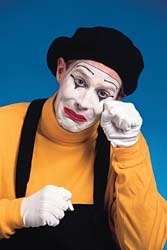
 BOWDLERIZE
BOWDLERIZETo edit offensive parts out of something. If the hero in an R-rated movie adapted for TV exclaims, “Oh shoot fudge darn!” but his lips seem to be saying something else, that movie has been bowdlerized.
The word "bowdlerized" comes from the name of Dr. T. Bowdler, who decided to publish an edition of Shakespeare in 1818 without sexual references or double-entendres. Mr. Bowdler thought he was performing a great service for humanity, but generally if we call something bowdlerized, we’re implying that it was edited in a prudish way.
EXAMPLE: "Being an iconic classic, however, hasn’t protected The Adventures of Huckleberry Finn from being banned, bowdlerized and bleeped."
—New York Times (Jan 7, 2011)
 campanology
campanologyPRONUNCIATION:
(kam-puh-NOL-uh-jee)
MEANING:
noun: The art or study of bell-ringing or making bells.
ETYMOLOGY:
From Latin campana (bell). From the Campania region in Italy, known for the bronze that was used to cast bells. Earliest documented use: 1847.
NOTES:
The term bell-ringing is preferred over campanology by people involved in it. In general, those in the know go with simpler terms. For example, caving over spelunking, coding over developing software, and so on. At any rate, here's an introductory video on campanology/bell-ringing that has managed to stuff as many puns as are legally permitted in a five-minute video. Did they miss any? Chime in.
USAGE:
"A woman who has helped secure the future of bell ringing across the east of England has been appointed MBE in the New Year Honours list for her services to campanology."
Norfolk bell ringer Betty Baines Appointed MBE; BBC News (London, UK); Dec 30, 2013.
"The call buttons were pressed so frequently that the passengers were in danger of getting a suntan from the lights, and the galley sounded like a campanology convention for the deaf."
Jack Leonard; Bad Altitude; AuthorHouse; 2005.
 CACOPHONOUS
CACOPHONOUShaving an unpleasant sound
ORIGIN
From Ancient Greek κακός (kakos, “bad”) + φωνή (phonē, “voice”).
EXAMPLE:
"Shoppers mingle, traders peddle their wares and children play in the street, all to a cacophonous backdrop of roaring motorbikes and honking cars."
—Reuters (May 28, 2010)

 perse
persePRONUNCIATION:
(puhrs)
MEANING:
adjective: Of a grayish blue or purple color.
ETYMOLOGY:
From persus (dark blue), from Latin Persicus (Persian), from Persia, former name of Iran. Why this color is associated with Persia is not entirely clear. Earliest documented use: 1387.
USAGE:
"How much the amethyst ring on her right hand mirrored the fading perse color of the sky."
Lisa Kusel; Hat Trick; Hyperion; 2005.
"He noticed the perse under each lid, and the blue, death-struck lips."
Thomas Keneally; Bring Larks and Heroes; Cassell Australia; 1967.

 LOVE the perse carrots, Jen! I wanted to buy some seeds for my friend and was able to find your picture and the link--but alas, that site doesn't sell them anymore. I'll keep looking :-)
LOVE the perse carrots, Jen! I wanted to buy some seeds for my friend and was able to find your picture and the link--but alas, that site doesn't sell them anymore. I'll keep looking :-)
 DELETERIOUS
DELETERIOUSharmful; injurious; hurtful
ORIGIN:
From Ancient Greek δηλητήριος (dēlētērios, “noxious, deleterious”), from δηλητήρ (dēlētēr, “a destroyer”), from δηλέομαι (dēleomai, “I hurt, damage, spoil, waste”).
EXAMPLE:
"It's a wonder, given how well-established the science is, that we continue to do things that are deleterious to the fragile ecosystem."

 iliad
iliadPRONUNCIATION:
(IL-ee-uhd)
MEANING:
noun:
1. A long narrative, especially an epic poem describing martial exploits.
2. A long series of miseries or disasters.
ETYMOLOGY:
After Iliad, a Greek epic poem traditionally attributed to Homer. From Ilion, ancient Greek name of the city of Troy, an area now in modern Turkey. Earliest documented use: 1579.
USAGE:
"She knew ... stories which form part of an Iliad of obscure hatreds, quarrels, adulteries, marriages."
Storm Jameson; Journey from the North, Volume 2; Collins; 1970.
"Professional football players are our gladiators. The only difference is that we, the fans, don't, as they did at the Colosseum in Rome, put our thumbs up or down to decide a player's fate. But then we don't have to; they all but kill themselves. In each of his interviews, Mr. Cohen asks former players: 'How're you holding up physically?' Everyone answers with an Iliad of injuries and woes."
Joseph Epstein; When Defense Ruled the Game; The Wall Street Journal (New York); Oct 26, 2013.

Jen ƸӜƷ wrote: "iliad
PRONUNCIATION:
(IL-ee-uhd)
MEANING:
noun:
1. A long narrative, especially an epic poem describing martial exploits.
2. A long series of miseries or disasters.
ETYMOLOGY:
After Iliad, a Gr..."
I didn't realize it was a word which could describe a poem!
PRONUNCIATION:
(IL-ee-uhd)
MEANING:
noun:
1. A long narrative, especially an epic poem describing martial exploits.
2. A long series of miseries or disasters.
ETYMOLOGY:
After Iliad, a Gr..."
I didn't realize it was a word which could describe a poem!
 LaLaLa Laura wrote: "Jen ƸӜƷ wrote: "iliad
LaLaLa Laura wrote: "Jen ƸӜƷ wrote: "iliadPRONUNCIATION:
(IL-ee-uhd)
MEANING:
noun:
1. A long narrative, especially an epic poem describing martial exploits.
2. A long series of miseries or disasters.
ETYMOLOGY:
A..."
I didn't either!
 damask
damaskPRONUNCIATION:
(DAM-uhsk)
MEANING:
noun: 1. A reversible fabric with a pattern woven into it, used for table linen, upholstery, etc.
2. Short for damask rose.
3. The color of damask rose: grayish red or pink.
4. Short for damask steel.
5. Wavy markings on such steel.
adjective: 1. Made of or resembling damask.
2. Having the color of damask rose.
verb tr.: 1. To decorate or weave with richly-figured designs.
2. To inlay a metal object with gold or silver patterns; to gild.
ETYMOLOGY:
From Damascus, where this fabric was first produced. Earliest documented use: 1325.
USAGE:
"The richly coloured damask-covered walls do evoke the palaces for which many of the pictures were intended."
Getting Away from Cultural Spinach; The Economist (London, UK); Aug 28, 2008.

 EPHEMERAL
EPHEMERALEphemeral (ə-FEM-ər-əl) was originally a medical term with the specific meaning "lasting only one day," as a fever or sickness (Hemera means "day" in Greek.) The word became more general, coming to mean "lasting a short time," covering the life spans of plants or insects and then eventually anything that is fleeting or transitory.
 Julia wrote: "EPHEMERAL
Julia wrote: "EPHEMERALEphemeral (ə-FEM-ər-əl) was originally a medical term with the specific meaning "lasting only one day," as a fever or sickness (Hemera means "day" in Greek.) The word became more general..."
Julia wrote: "EPHEMERAL
Ephemeral (ə-FEM-ər-əl) was originally a medical term with the specific meaning "lasting only one day," as a fever or sickness (Hemera means "day" in Greek.) The word became more general..."
I often feel my reading experiences of a really good book are ephemeral.
 Jen ƸӜƷ wrote: "Julia wrote: "EPHEMERAL
Jen ƸӜƷ wrote: "Julia wrote: "EPHEMERALEphemeral (ə-FEM-ər-əl) was originally a medical term with the specific meaning "lasting only one day," as a fever or sickness (Hemera means "day" in Greek.) The word becam..."
That's why I take notes, ex-teacher that I am :-) I was able to read my notes on The Shadow of the Wind by Carlos Ruiz Zafón before I read the sequel, The Angel's Game, a year later! Otherwise, the first book would have been lost in the ephemeral ether of the cosmos! :-)
 Julia wrote: "Jen ƸӜƷ wrote: "Julia wrote: "EPHEMERAL
Julia wrote: "Jen ƸӜƷ wrote: "Julia wrote: "EPHEMERALEphemeral (ə-FEM-ər-əl) was originally a medical term with the specific meaning "lasting only one day," as a fever or sickness (Hemera means "day" in Greek...."
So true, I've been trying to read trilogies and the like in order, so I wait for them all to be published.
 GREGARIOUS
GREGARIOUS 1. (Sociology) enjoying the company of others
2. (Zoology) (of animals) living together in herds or flocks
ORIGIN:
Latin gregarius "of a flock or herd", from greg-, grex flock, herd
First Known Use: 1668
 bloviate
bloviatePRONUNCIATION:
(BLO-vee-ayt)
MEANING:
verb intr.: To speak pompously.
ETYMOLOGY:
Pseudo-Latin alteration of blow (to boast). Earliest documented use: 1845.
USAGE:
"All you cinephiles who like to find grand statements and social criticism in horror movies, prepare to bloviate. It's midnight at the Tribeca Film Festival."
Neil Genzlinger; Scare Me, Sure, But Also Make A Statement; The New York Times; Apr 18, 2013.
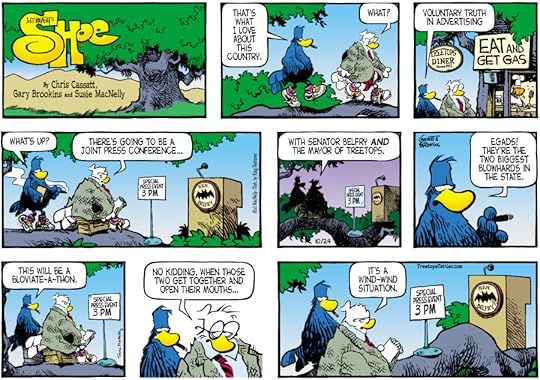
 skulduggery
skulduggeryPRONUNCIATION:
(skuhl-DUHG-uh-ree)
MEANING:
noun: Underhand dealing: trickery, bribery, etc.
ETYMOLOGY:
An American coinage, apparently from the alteration of Scots sculduddery (fornication, obscenity). Earliest documented use: 1867.
USAGE:
"In the 1980s [the Vatican Bank] was accused of involvement in financial skulduggery and responsibility for the still-mysterious death of a prominent Italian banker, Roberto Calvi."
God's Bankers; The Economist (London, UK); Jul 7, 2012.
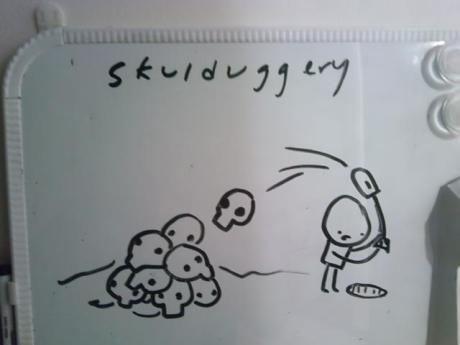
 honeyfuggle
honeyfugglePRONUNCIATION:
(HUN-ee-fuh-guhl)
MEANING:
verb tr., intr.: To deceive or swindle, especially by flattery.
ETYMOLOGY:
Perhaps from honey + fugle (to cheat). Earliest documented use: 1829. Also spelled as honeyfugle.
USAGE:
"Don't try to honeyfuggle me, Wolf McCloud. I'm not pretty, and we both know it."
Jane Bonander; Wild Heart; Pocket Books; 1995.
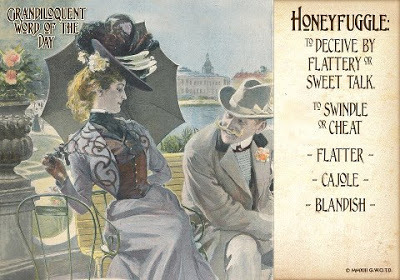
 lallygag or lollygag
lallygag or lollygagPRONUNCIATION:
(LAL-ee-gag, LOL-ee-gag)
MEANING:
verb intr.:
1. To fool around, waste time, or spend time lazily.
2. To neck.
ETYMOLOGY:
Origin uncertain. Earliest documented use: 1862.
USAGE:
"I lallygagged around and when it was evident that they were not coming home to take me, I had to start off."
Margaret Mason; A Memory at Large; RoseDog Books; 2011.

 bumfuzzle
bumfuzzlePRONUNCIATION:
(bum-FUZ-uhl)
MEANING:
verb tr.: To confuse.
ETYMOLOGY:
From bum-, probably from bamboozle (to deceive) + fuzzle (to confuse). Earliest documented use: 1900.
USAGE:
"Latt insists the company is not trying to bumfuzzle anybody into believing Asylum's releases are big-studio product."
James Hebert; Knockoff Movies Touted as 'Tie-ins'; Union-Tribune (San Diego, California); August 17, 2007.
 CHORTLE
CHORTLEto laugh because you are amused or pleased by something
ORIGIN:
Coined by Lewis Carroll in his poem "Jabberwocky", perhaps as a blend of chuckle and snort.
Books mentioned in this topic
The Clicking of Cuthbert (other topics)The Crucible (other topics)
A History of Modern Drama, Volume I (other topics)
Toy Stories: Photos of Children from Around the World and Their Favorite Things (other topics)
The Book of Life (other topics)
More...
Authors mentioned in this topic
Leo Tolstoy (other topics)P.G. Wodehouse (other topics)
Leonardo da Vinci (other topics)
Theodore Roethke (other topics)
David Krasner (other topics)
More...




